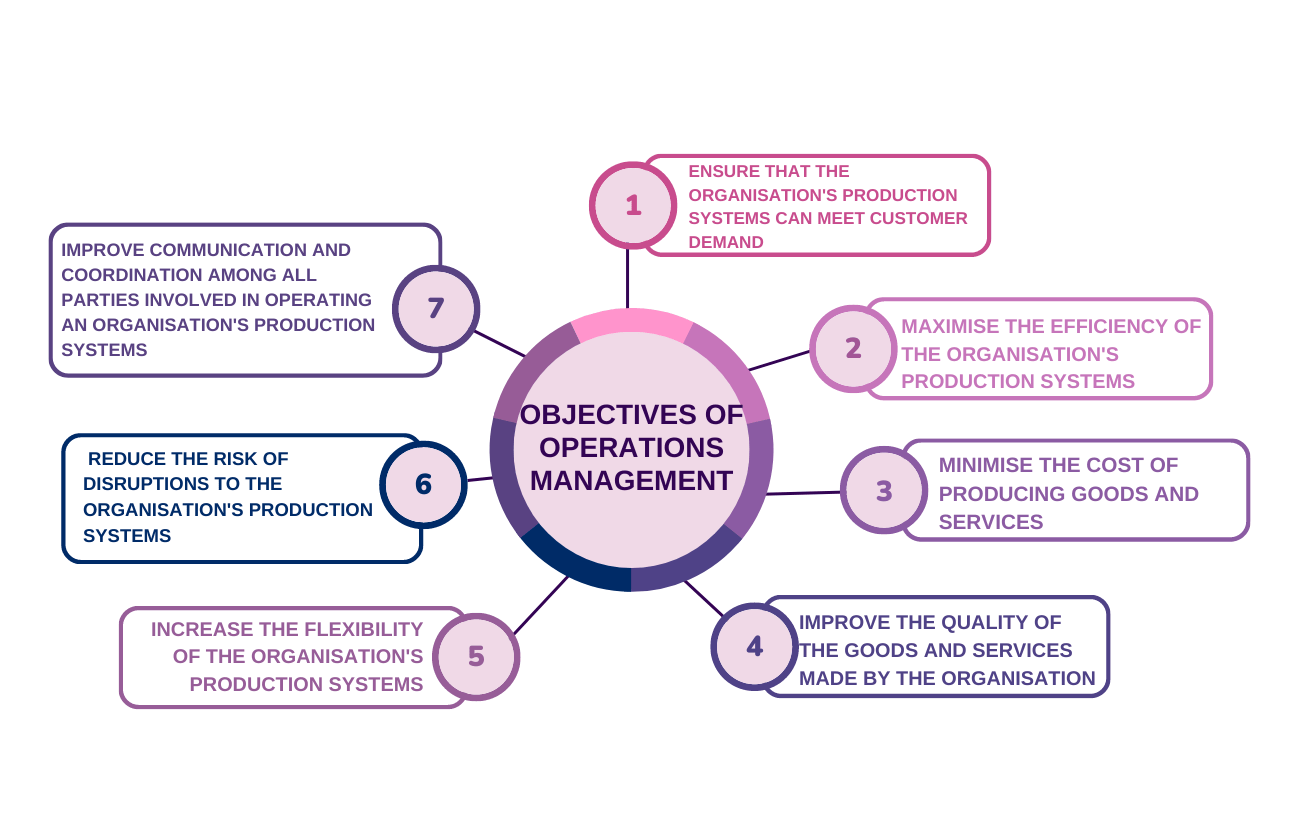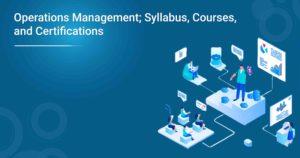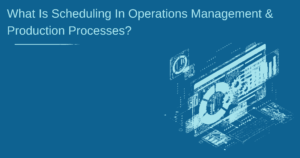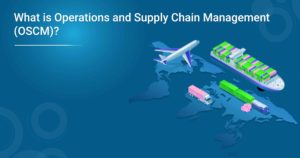Nature of Operations management: Operations Management is a field that focuses on the management of resources and processes to create and deliver goods or services. It is a relatively new domain, only emerging as a different discipline in the early 20th century. Operations management is concerned with all aspects of an organisation’s operations, including the design, planning, control, and execution of processes.
Operations management aims to ensure that the organisation’s operations are efficient and effective. This blog post will explore the nature, scope, and fundamentals of operations management. We will also discuss some of the challenges faced by operations managers.
Before moving ahead and understanding the nature of operations management, check out our Advanced Certificate in Operations, Supply Chain and Project Management which has all the necessary learning resources you require to be an operations manager.
Objectives of Operations Management
Operations management is a field concerned with designing, planning, controlling, and operating an organisation’s production systems. The objectives of operations management are to:
- Ensure that the organisation’s production systems can meet customer demand. Operations management is the process of ensuring that business operations are efficient with regards to using as few resources as necessary and effective in terms of meeting customer demand. The ultimate goal and nature of operations management are to improve the efficiency and effectiveness of an organisation’s operations while also reducing costs.
- Maximise the efficiency of the organisation’s production systems. The goal of operations management is to maximise the efficiency of these production systems so that the organisation can produce goods and services more effectively and efficiently. There are plenty of different tools and techniques that operations managers use to achieve this goal, such as process improvement methods, quality control techniques, and work measurement tools.
- Minimise the cost of producing goods and services. The objective of operations management is to minimise the cost of producing goods and services while still providing high levels of quality and customer satisfaction. One of the effective ways this can be accomplished is by streamlining production processes and eliminating waste. Additionally, effective operations managers will continuously look for ways to improve efficiency and productivity to keep costs low.
- Improve the quality of the goods and services made by the organisation. The objective of operations management is to improve the quality of the goods and services of the organisation. It can be done through a variety of means, such as improving the efficiency of production processes, ensuring that products are produced to meet customer specifications, and reducing waste and defects in finished products. Improving quality can lead to increased customer satisfaction and loyalty, which can, in turn, lead to higher sales and profits for the organisation.
- Increase the flexibility of the organisation’s production systems. Operations management strives to increase the flexibility of an organisation’s production systems. The goal is to make the organisation more responsive to market demands and better adapt to changes in the business environment. This may be accomplished through various means, such as introducing new technologies, revising processes, or changing the organisational structure.
- Reduce the risk of disruptions to the organisation’s production systems. The leading objective of operations management is to reduce the risk of disruptions to the organisation’s production systems. This includes ensuring that all necessary resources are available and that processes are running smoothly and efficiently. Operations managers work to identify and mitigate potential risks before they can cause problems. Doing so helps keep the organisation’s production systems running smoothly and avoid costly downtime.
- Improve communication and coordination among all parties involved in operating an organisation’s production systems. The objective of operations management is to Improve communication and coordination among all parties involved in the operation of an organisation’s production systems. This includes managers, employees, suppliers, customers, and other stakeholders. By improving communication and coordination among all parties involved in production, operations managers can improve efficiency and effectiveness throughout the organisation.
Also Read: What is Operations and Supply Chain Management (OSCM)?
Scope Of Operations Management
It is the process of planning, organising, directing, and controlling the resources needed to produce goods and services. The scope of operations management includes all the activities necessary to plan, design, and manage the production and distribution process.
The eight scopes of operations management are as follows:
1) Facility layout planning: This step involves deciding how best to utilise the space in a factory or office to optimise workflow.
2) Workforce planning and management: This includes ensuring that there are enough employees with the right skills to do the work required and managing employee performance.
3) Inventory management: This encompasses everything from raw materials to finished products and ensuring that inventory levels are maintained at an optimum level.
4) Scheduling: This is creating a production schedule that meets customer demand while maximising efficiency.
5) Quality control: Quality control is essential to ensuring that products meet customer expectations and standards.
6) Transportation and logistics: Operations managers must plan to move goods from suppliers to customers efficiently.
7) Maintenance: Regular maintenance is necessary to keep equipment and facilities running smoothly.
8) Project management: Many operations require project management to ensure that they are completed within time and budget.
What Are The Goals Of Operations Management?
The goal of operations management is to ensure that all processes within the organisation are running smoothly and efficiently. It includes everything from product development and manufacturing to distribution and customer service. Ultimately, the aim is to minimise waste and maximise resources to improve profitability.
To achieve these goals, operations managers must have a strong understanding of all aspects of the business and how they communicate with one another. They must also be able to identify areas for improvement and put in place systems and controls to monitor performance. Regular reviews and audits are essential to improve efficiency levels continuously.
Components of Operations Management

Forecasting
Forecasting is a critical component and nature of operations management. It helps organisations make informed decisions about future production needs and capacity requirements. There are several vital elements to consider when developing a forecasting system, including:
- The type of product or service being produced
- The underlying demand for the product or service
- The lead time required to produce the product or service
- The amount of variability in the production process
- The level of inventory desired
An effective forecasting system takes all of these factors into account and provides accurate information that can be used to make sound operational decisions.
Total Quality Management
Total Quality Management is a strategic approach to improving an organisation’s competitiveness. It is a philosophy that emphasises the need for continuous advancement in all aspects of an organisation’s operations, with the ultimate goal of providing customers with products and services that meet or exceed their expectations.
The basic components of TQM are:
1) Quality planning: This involves setting quality objectives and goals and developing plans to achieve them.
2) Quality control: This is the process of monitoring and measuring the quality of products and services to ensure they meet desired levels. It also includes taking corrective action when necessary.
3) Quality assurance: This entails developing and implementing procedures and processes to prevent the occurrence of defects in the first place.
4) Quality improvement: This encompasses continual efforts to identify and eliminate sources of defects and variation to improve overall quality levels.
Materials Requirement Planning
In materials requirement planning (MRP), the timing of production activities is planned to ensure that materials are available when needed. This type of planning is necessary because many manufacturing processes require the use of raw materials, which must be obtained from suppliers and often have lead times that must be taken into account. In addition, finished products are often required for assembly or other downstream processes before they can be shipped to customers.
To effectively manage the flow of materials through a manufacturing organisation, MRP systems keep track of three types of information:
1) The master schedule, which indicates when each finished product is due to be completed;
2) The inventory records, which show how much material is on hand and where it is located; and
3) The bill of materials (BOM), which lists the raw materials and subassemblies required to make each finished product.
Using this information, MRP systems generate schedules for purchasing raw materials and components as well as for producing finished products. These schedules consider lead times for procurement and production, as well as any minimum order quantities that may apply. In some cases, MRP systems also generate rescheduling messages if there are delays in obtaining necessary supplies.
Also Read: What Is Capacity Planning In Operations Management?
Just In Time
Just In Time (JIT) is a manufacturing philosophy that arose in the 1970s. Its main goal is to eliminate waste throughout the production process by producing only what is needed and in the quantities needed.
This philosophy was born out of necessity as businesses increasingly felt the squeeze of overseas competition. To survive and thrive, they had to find ways to operate more efficiently and cut costs wherever possible. JIT became one of the most popular methods for achieving this.
There are four key principles of JIT:
1) Produce only what is needed
2) Produce only what is demanded
3) Do not overproduce or keep excessive inventory on hand
4) Streamline the production process to minimise waste and maximise efficiency.
When properly implemented, JIT can result in significant cost savings, improved quality control, and customer satisfaction. It can also lead to shorter lead times, increased flexibility, and reduced inventories.
Inventory Management
It is the process of tracking inventory levels and making decisions about what levels are acceptable. This includes both raw materials and finished goods. The aim should be to strike a good balance between having too much inventory (which ties up cash and can lead to obsolescence) and too little inventory (which can lead to stockouts and lost sales).
Inventory management is a critical component of operations management. It encompasses all of the activities and processes associated with the management of inventory, including but not limited to procurement, warehousing, transportation, and customer service.
An effective inventory management system must take into account both the physical and financial aspects of inventory. The physical aspect includes the actual goods or materials that make up the inventory, while the financial aspect encompasses the costs associated with procuring, storing, and transporting the inventory.
An effective inventory management system will minimise both the physical and financial risks associated with excess or obsolete inventory. Excess inventory can tie up valuable resources and lead to storage costs, while obsolete inventory can result in lost sales and customers.
The components of an effective inventory management system include:
1) A clear understanding of customer demand: This involves forecasting future demand for products or services and ensuring that there is enough inventory on hand to meet this demand.
2) An efficient procurement process: This ensures that the right products are ordered from suppliers at the right time and in their required quantities.
3) An effective warehousing strategy: This involves storing inventory in a way that minimises damage, loss, or theft while maximising space utilisation.
4) A well-designed transportation network: This ensures that finished goods are delivered to customers within the stipulated time and in good condition.
What Are The Roles of the Operations Manager?
A proficient operations manager is responsible for all the day-to-day running of the business. They ensure that all operations are conducted smoothly and efficiently.
They plan, implement, and control operational processes and activities. They also contribute to the formulation of company policies and objectives.
The operations manager is also responsible for managing and developing staff. They motivate staff to achieve goals and maintain high levels of performance.
The operations manager plays a vital role in ensuring that the company meets its targets and objectives. They play a vital role in the success of the business.
Conclusion
Operations management is a vital part of any business, and it’s essential to understand this field’s nature, scope, and fundamentals. This article must have opened new perspectives and given you a better understanding of operations management and its role in businesses. If you’re interested in learning more about the nature of operations management, be sure to check out our Advanced Certificate in Operations, Supply Chain and Project Management.
More Information:
Why Do Businesses Need An Operations Strategy?
Operations Management: Definition, Examples, and Strategies




























